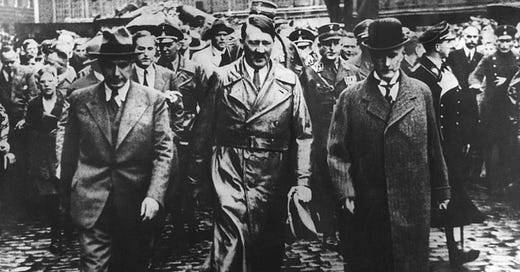How Business Leaders' Support for Hitler Led to Regret and Ruin
Alfred Hugenberg's Pivotal Support: Alfred Hugenberg, a prominent industrialist and media mogul, played a crucial role in Hitler's ascent by providing significant electoral support that facilitated Hitler's appointment as chancellor in January 1933. Despite warnings from associates about the potential dangers of aligning with Hitler, Hugenberg believed he could control and benefit from the association.
Initial Business Opposition to Nazism: During the 1920s and early 1930s, many business leaders were wary of Hitler's National Socialist German Workers' Party due to its anti-capitalist rhetoric and policies advocating for the nationalization of industries. Consequently, the Nazi Party relied heavily on membership fees and small donations until securing substantial backing from figures like Hugenberg and industrialist Fritz Thyssen.
Corporate Collaboration and Complicity: Once in power, the Nazi regime collaborated with various German corporations, which contributed to the war effort and participated in atrocities, including the use of slave labor and involvement in unethical medical experiments. This partnership between the state and industry facilitated the regime's objectives but implicated businesses in its crimes.
Post-War Reckoning and Consequences: After World War II, several corporate leaders faced trials and convictions for war crimes due to their collaboration with the Nazi regime. Hugenberg, however, managed to avoid significant punishment, portraying himself as a victim rather than a participant in Nazi activities. He remained unrepentant until his death, refusing to acknowledge his role in enabling Hitler's rise and the ensuing devastation.
Lessons on Political Alliances: This underscores the dangers of political and business leaders supporting authoritarian figures for personal or economic gain. The experiences of Hugenberg and others illustrate how such alliances can lead to unintended and catastrophic consequences, ultimately resulting in regret and historical condemnation.
Elon Musk Proposes Blockchain Integration for U.S. Treasury
Allegations of Fraudulent Payments: Musk has accused career Treasury officials of unlawfully approving payments that are either fraudulent or inconsistent with congressional funding laws. He has not provided specific evidence to support these claims.
Advocacy for Blockchain Integration: In response to these alleged issues, Musk advocates for transitioning Treasury operations onto a blockchain platform. He suggests that such a move would enhance transparency and accountability in federal financial transactions.
Unclear Implementation Details: Musk has proposed various applications for blockchain within the Treasury, including data safeguarding, federal spending tracking, payment processing, and management of agency assets. However, he has not provided detailed explanations of how these implementations would function in practice.
Market Reactions and Legal Challenges: Following Musk's announcement, several activist groups and unions filed a lawsuit against his actions, leading to significant volatility in cryptocurrency markets. Notably, Dogecoin's value dropped by 15%, Bitcoin decreased by 2.5%, and Ethereum experienced an 18% decline—the largest since November.
Criticism from Experts: Critics argue that moving Treasury assets to a blockchain could lead to increased inflation, slower transaction processing times, and heightened cryptocurrency prices. They also express concerns that such a shift might weaken the U.S. dollar's global standing, potentially destabilizing the real-world economy.
US Stocks
US stocks close at session highs to post solid gain
The S&P 500 and the Nasdaq 100 closed at their highs of the day with solid gains, while the Russell 2000 retreated on Thursday.
NvidiaNVDA $128.14 (3.09%) climbed as enthusiasm for the picks-and-shovels AI trade returns and Morgan Stanley doubled down on the chip designer as its top pick in the sector. MetaMETA $712.40 (0.96%) booked its 14th consecutive day in the green, a record for the stock. Their Magnificent 7 peer TeslaTSLA $370.83 (-1.02%) headed lower amid disastrous European sales figures.
Despite posting very solid results, QualcommQCOM $168.32 (-3.72%) tumbled as investors doubt strength in the smartphone market will have staying power.
Palantir TechnologiesPLTR $112.80 (9.82%) was also one of the top performers in the S&P 500, with its market cap surpassing the likes of McDonald’s and American Express.
FordF $9.34 (-7.44%) had an abysmal session after telling investors that 2025 would be worse than 2024 from a profitability perspective. PelotonPTON $8.42 (12.01%) soared as its earnings report and guidance for the current quarter bolstered resolve that its path towards profitability is at hand.
RobloxRBLX $68.10 (-11.08%), on the other hand was crushed as its daily active user count heads in the wrong direction. Trump Media & Technology GroupDJT $32.12 (6.69%) also made waves by filing for trademarks for a slew of ETFs, including one that would hold bitcoin.
What Else Are We Biting
“Retail traders are breaking all records,” says JPMorgan.
Tinder will try AI-powered matching as the dating app continues to lose users.
Early Meta employee sues for sexual harassment, gender discrimination.
Biting Fact Of The Day
Americans bet more than $140 billion on sports last year.






Alfred Hugenberg, a prominent industrialist and media mogul, played a crucial role in Hitler's ascent by providing significant electoral support that facilitated Hitler's appointment as chancellor in January 1933. Despite warnings from associates about the potential dangers of aligning with Hitler, Hugenberg believed he could control and benefit from the association.